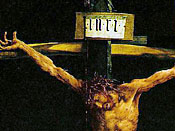This is a rich time of year. The Church's calendar invites us to keep this as a range of Festivals: The Holy Family, The Sunday after Christmas, even the feast of the Epiphany...and of ocurse it is New Year's Eve!
All of these have about them the sense of new beginnings.
So we naturally are drawn to reflect on how we respond.
What might be our resolutions?
Most of us are not particularly good at keeping these,
so much so that they are the cause for laughter.
What if we were to take our reading today from Colossians 3
and see hat here there are a whole series of new beginnings being set our for us to act upon
As God’s chosen ones, holy and beloved, clothe yourselves with compassion, kindness, humility, meekness, and patience. Bear with one another and, if anyone has a complaint against another, forgive each other; just as the Lord has forgiven you, so you also must forgive. Above all, clothe yourselves with love, which binds everything together in perfect harmony. And let the peace of Christ rule in your hearts, to which indeed you were called in the one body. And be thankful. Let the word of Christ dwell in you richly; teach and admonish one another in all wisdom; and with gratitude in your hearts sing psalms, hymns, and spiritual songs to God. And whatever you do, in word or deed, do everything in the name of the Lord Jesus, giving thanks to God the Father through him.
And so there a range of things we could focus on as our resolutions...not just for the New Year but for our Christian life.
clothe yourselves with compassion, kindness, humility, meekness, and patience. Bear with one another and, if anyone has a complaint against another, forgive each other;
The image of putting on new clothig is a popular one that Paul uses.
It is about the outward appearance that we project to others
and also about the way we keep ourselves secure and intact!
Paul sees kindness, humility, gentleness and patience
to be the hallmarks of the Christian.
I had a very intellectual friend once who was really too smart for his own good.
But he also had a great sense of priority
and he would say...if it was a choice between being intellectual and being kind
then being kind was the way to go
We often forget that.
We justify unkindness, impatience, intolerance
in all sorts of rationalistic ways but we hear the Gospel point us elsewhere.
This year can we we see that it is kindness, humility, and patience
that are meant to draw us and lead us on
as the Lord has forgiven you, so you also must forgive.
New beginning will also need to be about forgiveness
We all carry a burden of the unforgiving heart
of those who have hurt us recently or a long time ago,
the Gospel tells us that in order to be free ourselves
we need to forgive
where are you being called to forgive at this new beginning?
And will you do it?
Above all, clothe yourselves with love,
It comes as no suprise to us that the Gospel points us towards love as the key.
Not the mushy sort of slush, or the sexy kind of imaginary stuff that is often exploiotative
and may even steer us to sinfulness
but rather the self-giving love
of a mother towards a child
of one who gives themself for another
We see in Jesus the ideal of love that we are called to.
it binds everything together in perfect harmony.
Finally Paul reminds us that we are called to be in relationship with Christ.
The fruit of this will be peace, stability, harmony...who of us does not want this?
let the peace of Christ rule in your hearts,
and Let the word of Christ dwell in you richly;
Here Paul would appear to be talking both about that word that we read
which teaches and admonishes us in all wisdom;
and fills our hearts with praise
but it is also about whatever you do, in word or deed,
we are to do everything in the name of the Lord Jesus, giving thanks to God the Father through him.
All this might seem a tall order but it is the way of the true disciple
the way we are called to follow.
It is not so much...new resolutions
as ongoing resolutions
The character of the life of faith
that we seek to form in ourselves and in each other.
- kindness and humility
- forgiveness
- love and peace
- relationship with Christ
In a stable in Bethlehem, Lord, you show us a humility that we find overwhelming and wonderful
In the gift and mystery of human life togetther, you show us kindness, love and peace
And you invite us to live creatively in harmony with you and with each other.
Let this year be the year when we will dwell richly with Christ
and Christ will be born anew in our lives. Amen




